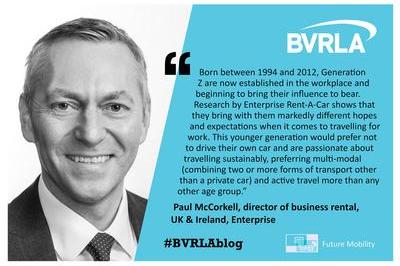Paul McCorkell, director of business rental UK & Ireland at Enterprise explores how Gen Z are leading the way when it comes to travelling sustainably, preferring multi-modal forms of transport and keen to avoid using their own car for a business trip.

Born between 1994 and 2012, Generation Z are now established in the workplace and beginning to bring their influence to bear. Research by Enterprise Rent-A-Car shows that they bring with them markedly different hopes and expectations when it comes to travelling for work. This younger generation would prefer not to drive their own car and are passionate about travelling sustainably, preferring multi-modal (combining two or more forms of transport other than a private car) and active travel more than any other age group.
Enterprise surveyed 4,000 people in Europe, including 1,000 in the UK, who drive for work. The research showed that Gen Z are keener to avoid using their own car for a business trip (60%) than Baby Boomers (41%), who were born between 1946 and 1964. Younger workers are especially keen on multi-modal travel: almost nine in 10 (88%) of Gen Z employees had made a multi-modal journey in the last 12 months, compared with only 57% of Baby Boomers.
Enthusiasm for alternative forms of transports extends to active travel choices, with Gen Z workers twice as likely to have used a shared bike or e-bike for work, compared to older generations. When asked about the motivation to use multi-modal and active transport, Gen Zs cited the opportunity to exercise more and to try something new, alongside pressure from family, friends and colleagues to travel in a more sustainable manner.
The desire to embrace new ways of doing things and to make greener travel choices is clear, but when it comes to the crunch Gen Z ends up defaulting to private cars, despite the environmental impact and costs to their employer.
Alongside distinct differences between generations, the research also showed how grey fleet* is still the default for many organisations, despite higher associated costs, risks and emissions.
Research in general shows that younger generations are learning to drive later and are deferring car ownership. However, Enterprise’s survey revealed that when it comes to how they are travelling for work they are just as likely to default to business trips by car as any other age group and this is because employers are not offering enough alternatives.
Two-thirds (64%) of companies aren’t encouraging multi-modal travel, with most (87%) still relying on employees to use their own personal car for work trips. This has huge implications in terms of carbon emissions from older and poorly maintained cars in addition to the costs of mileage reimbursement. Companies may also be missing out on opportunities to reduce cost, risk and cut emissions while improving employee retention by giving more flexible, accessible and affordable mobility options that are appealing to younger recruits.
The implication for businesses is that creating a travel policy with options that better cater to Gen Z preferences can start to create an organisation-wide shift in positive travel habits. Multi-modal travel that combines an element of active travel with public and owned transport can be effective for many journeys, bringing multiple benefits to the employee and company.
This shift could help organisations on the journey to reduce carbon while being more appealing to potential Gen Z recruits, reducing risk and costs along the way. Younger generations are now in the driving seat to lead, adopt and influence new ways of thinking, which companies can benefit from when changing or creating their business travel strategy.
* Grey fleet is a term that describes the use of personal vehicles for business purposes.




